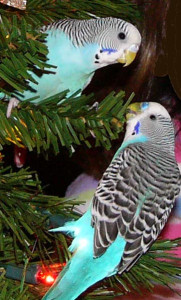Deciding on a a Pet Bird?
 Not everyone wants to bring home a dog or a cat. Some people prefer other animals and many enjoy watching birds. If that’s you, a pet bird is a great idea. With that in mind, let’s talk about preparing for a pet bird and what it’s like to keep one.
Not everyone wants to bring home a dog or a cat. Some people prefer other animals and many enjoy watching birds. If that’s you, a pet bird is a great idea. With that in mind, let’s talk about preparing for a pet bird and what it’s like to keep one.
First you need to consider the type of pet bird you want. There are so many species from which to choose! However, not all birds make suitable pets or even readily available. The most common species of birds kept as pets include:
Parakeets:
(Budgerigars) Arguably, parakeets are the most popular and they do make wonderful pets, especially if this is your first time having a pet bird. They take very little space and don’t require as much maintenance as larger birds. They are relatively quiet but can learn a couple of phrases. They live about 12 to 14 years.
Cockatiels:
Slightly larger than Parakeets, Cockatiels require a little more space. They sing and whistle as well as mimic other sounds. They live approximately 15 to 20 years and also make a good choice for new bird owners.
Lovebirds:
Lovebirds are a small parrot species. They are intelligent and fairly quiet. They live up to 20 years and are about 6 inches from the top of their head to the tip of their tail. They are also a good choice for new bird owners and those who live in apartments.
African Grays:
Many first-time bird owners choose this species of bird because they are able to learn to speak up to 2,000 words. They are smart but also demanding. They can live up to 70 years so it is important to be prepared to provide for the bird for the duration of its life.
What you need for your new pet bird
Obviously you’ll need a cage. I recommend getting the biggest one that fits your budget and have it set up before you bring your pet bird home. Be aware of cold drafts and harsh sunlight when choosing the location for your cage. While you may want to keep it near a window so your bird can see outside, you don’t want to place them in direct sunlight.
You’ll also need accessories for the cage, such as perches, toys and liners for the bottom. Most cages will have some type of perch but you may want to purchase additional perches or swings. Birds are also intelligent and require toys to keep them occupied while you’re away. You’ll also want to trade out toys from time to time to keep them happy.
Food, treats and supplements will also be needed. Ask the people you purchase the bird from what food they’ve given the bird. A book about the species of bird you’re getting will also give you ideas about the food requirements for your bird.
You can also talk with an avian veterinarian to learn more about your new pet and establish a relationship with them. Even though your bird will likely be healthy when you purchase it, it may become ill in the future. Choose a reputable avian veterinarian and introduce your bird soon after you purchase it.
The above tips will help you prepare for your new feathered friend. Take time to research so you’re able to make an informed decision about which species of bird is best for your family. Then do what you can to prepare your home for the new arrival and enjoy your new pet bird.
[xyz-ihs snippet=”Signoff1″]
